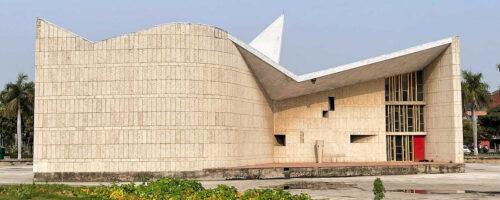 I say this as an alumnus who earned both a BE (Engineering) and an MBA from Panjab University. These are my views — and they may draw criticism — but it’s welcome.The Centre’s decision to overhaul Panjab University’s governance has provoked a loud outcry across Punjab. Leaders have called it an assault on federalism, an attack on democracy, and an insult to Punjab’s pride. But let’s strip away the noise. Chandigarh was built to be Punjab’s capital, and Panjab University was built in Chandigarh. The university was meant for learning — not for running miniature elections.
I say this as an alumnus who earned both a BE (Engineering) and an MBA from Panjab University. These are my views — and they may draw criticism — but it’s welcome.The Centre’s decision to overhaul Panjab University’s governance has provoked a loud outcry across Punjab. Leaders have called it an assault on federalism, an attack on democracy, and an insult to Punjab’s pride. But let’s strip away the noise. Chandigarh was built to be Punjab’s capital, and Panjab University was built in Chandigarh. The university was meant for learning — not for running miniature elections.
I have seen student elections turn into popularity carnivals and Syndicate elections descend into deal-making. These contests produced noise, not results. I always wanted to understand the concept of the Syndicate and Senate elections — and their contribution to education or students’ welfare. Honestly, I never could. Their impact on academic policy, faculty development, or student progress remains debatable at best. The Syndicate, in particular, served little practical purpose. Ending its election process should have happened years ago.
The new structure trims the Senate from 97 to 31 members. The Syndicate, once elected, will now be nominated. Graduate constituencies have been abolished, and ex-officio positions drastically reduced. The Centre claims this will streamline decision-making and reduce campus factionalism. Critics call it centralisation. Both sides may have a point — but here’s the truth few will admit: the old system had long stopped working.
Yes, the Centre’s legal route can and should be debated. Whether it had the authority to alter the Panjab University Act, 1947, without Punjab’s consent is a valid constitutional question. But the political storm over “Punjab’s rights” ignores one obvious fact — Panjab University sits in Chandigarh, a city built for Punjab but never returned to it. The outrage now on display is less about education and more about political theatre.

Is former Member of Punjab Public Service Commission
A farmer and keen observer of current affairs
Here lies the irony. The same leaders who now rage about losing control over Panjab University have quietly accepted losing Chandigarh itself. If they truly care about Punjab’s stake, why not demand the capital’s transfer back to Punjab — something that would automatically restore both moral and administrative authority over the university? Have they ever fought that battle seriously? Have they ever raised their voice about this unfulfilled promise to Punjab? Or have they simply accepted it as fait accompli — that Chandigarh is a forgotten past?
This selective outrage exposes the gap between rhetoric and conviction. Defending Punjab’s rights cannot mean defending outdated election rituals that contribute little to education. It means pursuing real control over what was taken away — and that begins with Chandigarh.
Let’s get a few things straight:
1. Education must come first. Universities exist to create knowledge, not political careers. Student and Syndicate elections became distractions, not democracies.
2. Governance should serve learning. Whether by nomination or election, the real test is faster decision-making, merit-based appointments, and stronger academic programs.
3. Accountability is the key. If the new nominated system merely replaces one form of politics with another, then it’s no reform at all.
4. Punjab’s leaders need clarity. Instead of empty outrage, they should demand Chandigarh’s transfer, legal safeguards for Panjab University’s autonomy, and measurable academic improvement.
5. Saffronisation in the garb of reform. Allegations that the Centre is using these reforms to push saffronisation must be dispelled clearly — and the responsibility for doing so lies squarely with the Centre.
This is not about Delhi versus Punjab; it’s about politics versus education.
Universities should breathe free of party banners and election noise. If the new governance model makes Panjab University more efficient, fair, and student-focused, let’s judge it by its outcomes — not by who shouts louder in its name.
Punjab deserves intellectual, educational renewal, not endless rhetoric and political statements and tweets just for sake of opposition and doing their party duty. Their duty to the society comes first.
If our leaders truly want to defend Punjab’s dignity, they should begin not with the Syndicate — but with Chandigarh itself.